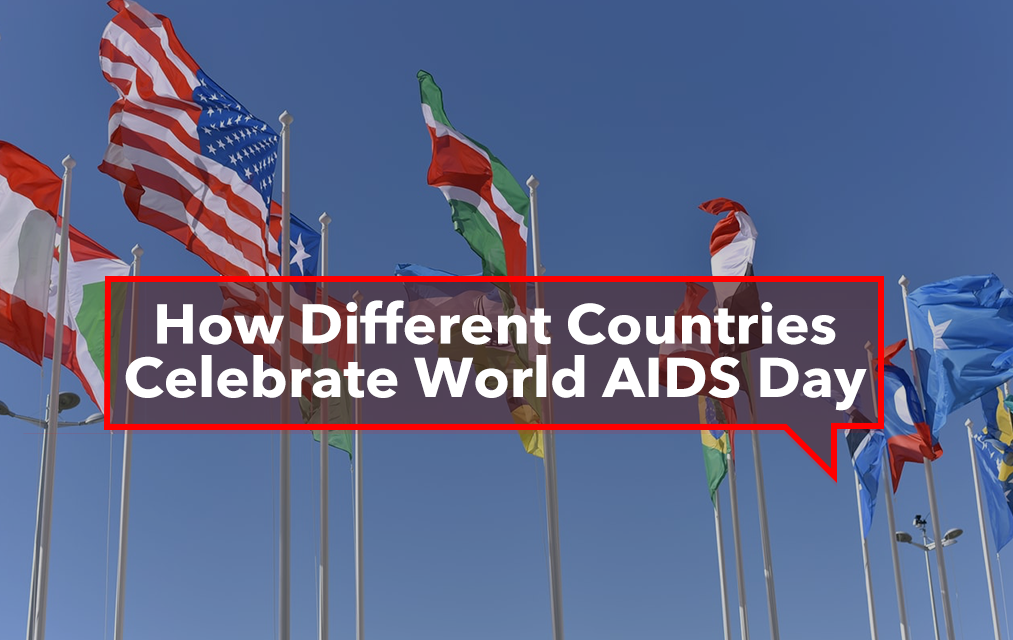How Different Countries Celebrate World AIDS Day

It is important that while living through the coronavirus pandemic, we don’t forget about the other pandemic affecting more than 38 million people across the globe. In 2019, almost 40 million people worldwide were living with HIV or AIDS; nearly two million of those infected were below the age of 15. In light of World AIDS Day, understanding how we can combat AIDS and stop the spread of HIV is something we can all apply to sexual and physical health in general.
On December 1st, 1988, to generate global awareness towards the AIDS crisis, World AIDS Day was established. Every year since, on the same day, the United Nations has worked with world governments to campaign around a chosen theme regarding HIV and AIDS. The theme for this year’s World AIDS Day was Global solidarity, shared responsibility.
This year’s theme addresses the concept that no one is safe until everyone is safe. It highlights how COVID-19 is showing us, once again, that topics of health are directly related to other critical issues, such as inequality, gender equality, and human rights. With that said, we must recognize World AIDS Day to the fullest extent, spreading awareness and knowledge to as many people as we can.
Below are a list of countries and the different ways they go about celebrating such an important day.
Canada
At the end of 2016, about 14% of people diagnosed with HIV were unaware that they had the virus. For this reason, Canada takes a strong stand towards celebrating World AIDS Day. In fact, December 1st also marks the beginning of Aboriginal AIDS Week in Canada.
While many Canadians are affected by AIDS, no community is hit harder than the indigenous populations. Almost every First Nation, Inuit, and Metis community deals with HIV/AIDS regularly. Many of the ways World AIDS Day, and Aboriginal AIDS Week, are celebrated is through traditional gatherings or school activities. Both settings are safe and supported spaces that encourage learning. During COVID-19, Canada will try its best to spread awareness through these channels in a safe and conducive manner.
Last year, many provinces, such as British Columbia and Nova Scotia, held World AIDS Day vigils to remember and honor the lives lost during the AIDS pandemic. Names were read, poetry performed, and music played to bring people together in the name of AIDS awareness.
Japan

As early as twenty years ago, Japan displayed record low numbers of HIV cases compared to the rest of the world. But after 2008 and 2010, the spread of new cases began to increase as other countries’ rates began to stagnate. The largest battle facing HIV carriers in Japan is the amount of stigma regarding homosexuality. In the fight for LGBTQ+ rights in Japan, many organizations have risen to provide resources for those living with HIV or AIDS.
PLACE Tokyo is an example of one of Japan’s leading organizations, assisting those affected by HIV/AIDS. This group provides consultations, hotlines, research projects, and training programs to better the environment, community, and lives of those with AIDS.
This year, PLACE Tokyo is participating in Tokyo’s annual Tokyo AIDS Weeks. This period of events starts on November 15th and ends on December 15th, and, for this year, has been made entirely online. The purpose is to envelop World AIDS Day and bring an added amount of public interest as participants aim to help improve the lives and families of those living with HIV/AIDS.
South Africa
No continent has been more significantly affected and stigmatized about the contraction of AIDS than Africa. Last year, South Africa embraced the theme of community by commemorating World AIDS Day in Orkney’s rural area. The event was also the first World AIDS Day of Winnie Byanyima as the new UNAIDS Executive Director.
World AIDS Day always places a large focus on Africa due to the high number of cases affecting men, women, and children alike. South Africa’s focus this year will be trying to find a safe alternative to their typical events that can raise a similar amount of awareness and government support.
The amount of care and attention we provide to COVD-19 is the type of dedication we should apply to the prevention of AIDS. If you want to learn more about AIDS prevention or learn how to get tested yourself, visit Think Before You Sleep today. Celebrating World AIDS Day is important, but the combat against AIDS needs to last more than just a day. Learn how you can fight every day of the year at Think Before You Sleep.

